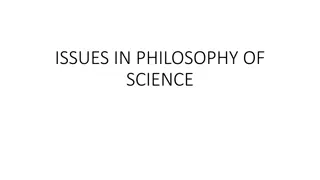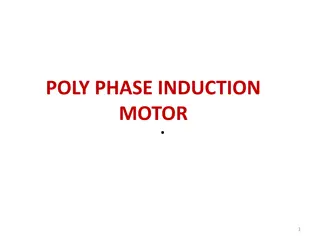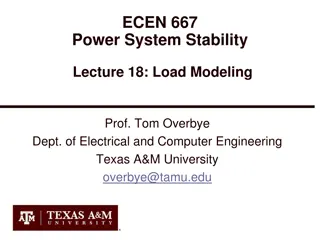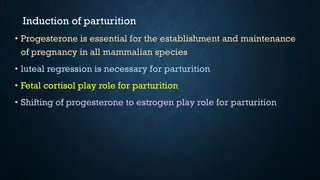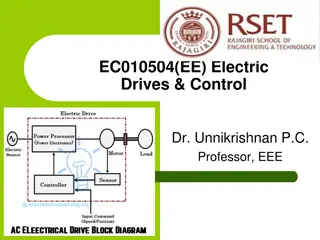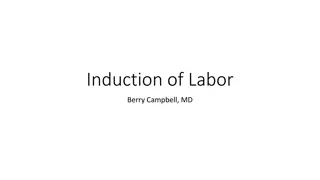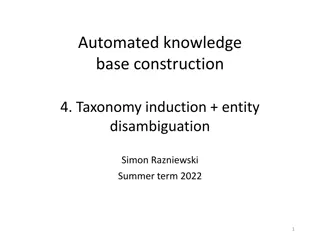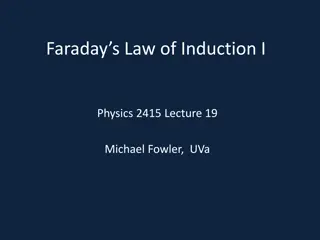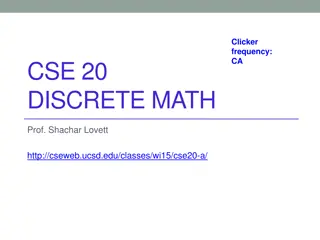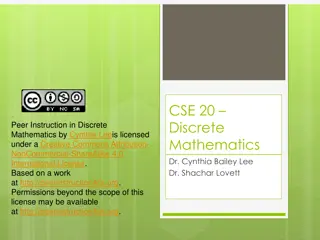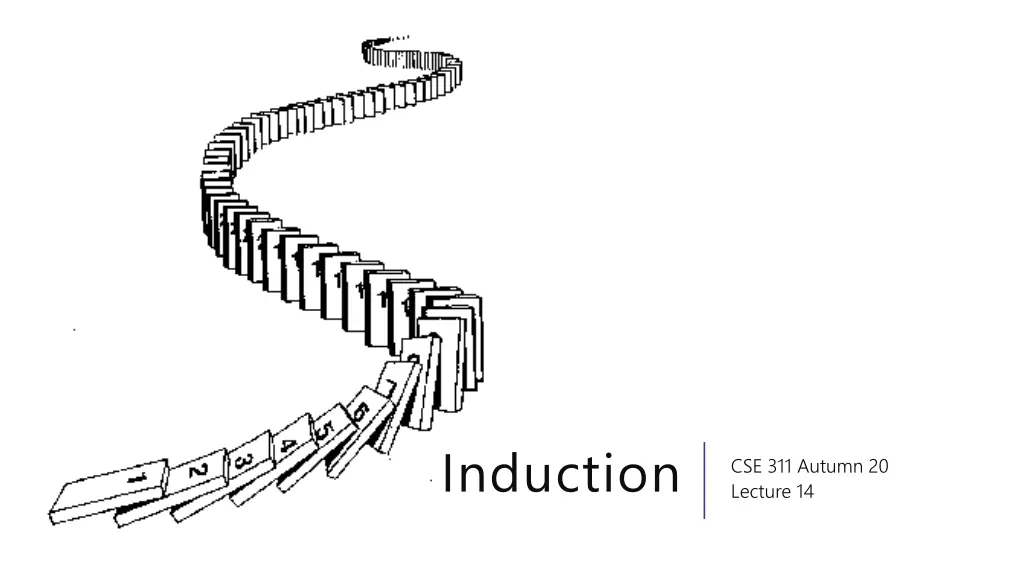
Understanding Recursion: A Step-by-Step Explanation
Delve into the world of recursion with an illustrated explanation of how it works using a simple code example. Explore why the base case and recursive calls are crucial for recursive functions to produce the correct output. Discover the essence of recursion through a structured and logical breakdown of CalculatesTwoToTheI function.
Download Presentation

Please find below an Image/Link to download the presentation.
The content on the website is provided AS IS for your information and personal use only. It may not be sold, licensed, or shared on other websites without obtaining consent from the author. If you encounter any issues during the download, it is possible that the publisher has removed the file from their server.
You are allowed to download the files provided on this website for personal or commercial use, subject to the condition that they are used lawfully. All files are the property of their respective owners.
The content on the website is provided AS IS for your information and personal use only. It may not be sold, licensed, or shared on other websites without obtaining consent from the author.
E N D
Presentation Transcript
Induction CSE 311 Autumn 20 Lecture 14
How do we know recursion works? Fill out the poll everywhere for Activity Credit! Go to pollev.com/cse311 and login with your UW identity Or text cse311 to 22333 //Assume i is a nonnegative integer //returns 2^i. public int CalculatesTwoToTheI(int i){ if(i == 0) return 1; else return 2*CaclulatesTwoToTheI(i-1); } Why does CalculatesTwoToTheI(4) calculate 2^4? Convince the other people in your room
How do we know recursion works? Something like this: Well, as long as CalculatesTwoToTheI(3) = 8, we get 16 Which happens as long as CalculatesTwoToTheI(2) = 4 Which happens as long as CalculatesTwoToTheI(1) = 2 Which happens as long as CalculatesTwoToTheI(0) = 1 And it is! Because that s what the base case says.
How do we know recursion works? There s really only two cases. The Base Case is Correct CalculatesTwoToTheI(0) = 1 (which it should!) And that means CalculatesTwoToTheI(1) = 2, (like it should) And that means CalculatesTwoToTheI(2) = 4, (like it should) And that means CalculatesTwoToTheI(3) = 8, (like it should) And that means CalculatesTwoToTheI(4) = 16, (like it should) IF the recursive call we make is correct THEN our value is correct.
How do we know recursion works? The code has two big cases, So our proof had two big cases The base case of the code produces the correct output IF the calls we rely on produce the correct output THEN the current call produces the right output
A bit more formally The base case of the code produces the correct output IF the calls we rely on produce the correct output THEN the current call produces the right output Let ?(?)be CalculatesTwoToTheI(i) returns 2?. How do we know ?(4)? ?(0) is true. And ? 0 ?(1), so ? 1 . And ? 1 ?(2), so ? 2 . And ? 2 ?(3), so ? 3 . And ? 3 ?(4), so ? 4 .
A bit more formally This works alright for ?(4). What about ? 1000 ??(1000000000)? At this point, we d need to show that implication ? ? ?(? + 1) for A BUNCH of values of ?. But the code is the same each time. And so was the argument! We should instead show ?[? ? ? ? + 1 ].
Induction Your new favorite proof technique! How do we show ?,?(?)? Show ?(0) Show ?(? ? ? ? + 1 )
//Assume i is a nonnegative integer public int CalculatesTwoToTheI(int i){ if(i == 0) return 1; else return 2*CaclulatesTwoToTheI(i-1); } Induction Let ?(?)be CalculatesTwoToTheI(i) returns 2?. Note that if the input ? is 0, then the if-statement evaluates to true, and 1 = 2^0 is returned, so ?(0) is true. Suppose ?(?) holds for an arbitrary ? 0. So ?(? + 1) holds. Therefore ?(?) holds for all ? 0 by the principle of induction.
Making Induction Proofs Pretty Let ?(?)be CalculatesTwoToTheI(i) returns 2?. Base Case Base Case (? = 0) Note that if the input ? is 0, then the if-statement evaluates to true, and 1 = 2^0 is returned, so ?(0) is true. Inductive Hypothesis Inductive Hypothesis: Suppose ?(?) holds for an arbitrary ? 0. Inductive Step Inductive Step: Since ? 0,? 1, so the code goes to the recursive case. We will return 2 CalculatesTwoToTheI(k). By Inductive Hypothesis, CalculatesTwoToTheI(k)= 2?. Thus we return 2 2?= 2?+1. So ?(? + 1) holds. Therefore ?(?) holds for all ? 0 by the principle of induction.
Making Induction Proofs Pretty All of our induction proofs will come in 5 easy(?) steps! 1. Define ?(?). State that your proof is by induction on ?. 2. Show ?(0) i.e. show the base case 3. Suppose ?(?) for an arbitrary ?. 4. Show ? ? + 1 (i.e. get ? ? ?(? + 1)) 5. Conclude by saying ? ? is true for all ? by induction.
Some Other Notes Always state where you use the inductive hypothesis when you re using it in the inductive step. It s usually the key step, and the reader really needs to focus on it. Be careful about what values you re assuming the Inductive Hypothesis for the smallest possible value of ? should assume the base case but nothing more.
The Principle of Induction (formally) ? 0 ; ?(? ? ? ? + 1 ) Principle of Induction ?(? ? ) Informally: if you knock over one domino, and every domino knocks over the next one, then all your dominoes fell over.
More Induction Induction doesn t only Show that ?=0 only work for code! 2?= 1 + 2 + 4 + + 2?= 2?+1 1. ?
More Induction Induction doesn t only Show that ?=0 Let ? ? = ?=0 We show ?(?) holds for all ? by induction on ?. Base Case ( ) Inductive Hypothesis: Inductive Step: only work for code! 2?= 1 + 2 + 4 + + 2?= 2?+1 1. 2?=2?+1 1. ? ? ?(?) holds for all ? 0 by the principle of induction.
More Induction Induction doesn t only Show that ?=0 Let ? ? = ?=0 We show ?(?) holds for all ? by induction on ?. Base Case (? = 0) ?=0 2?= 1 = 2 1 = 20+1 1. Inductive Hypothesis: Suppose ?(?) holds for an arbitrary ? 0. Inductive Step: We show ?(? + 1). Consider the summation ?=0 2k+1+ ?=0 2?= 2?+1+ 2?+1 1, where the last step is by IH. Simplifying, we get: ?=0 2?+1 +1 1. ?(?) holds for all ? 0 by the principle of induction. only work for code! 2?= 1 + 2 + 4 + + 2?= 2?+1 1. 2?=2?+1 1. ? ? 0 ?+12?= ? ?+12?= 2?+1+ 2?+1 1 = 2 2?+1 1 =




